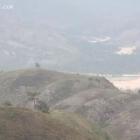ADVERTISEMENT
Agriculture
Resignation of Jean François Thomas, Minister of Agriculture
Here is a picture of the former Minister of Agriculture in Haiti, Jean François Thomas,
Agricultural Minister Jean Francois has been forced to resign due to students violently preventing him from entering the Agronomy and Veterinary building. They protest he has no experience in the sector.
Francois resigned to "save unjustified suffering to the agricultural sector, to the Government, and whole country" He adds the students' accusations are untrue.
Students also want Martelly to unappoint two secretaries of state for the same reason. They promise more trouble if Martelly does not.
Thomas Jacques, Minister of Agriculture, Natural Resources and Rural Development
Here is a picture of the current Minister of Agriculture, Natural Resources and Rural Development in Haiti, Mr. Thomas Jacques.
Agriculture Minister Thomas Jacques expressed his gratitude to actors in the agriculture sector for helping him realize several outcomes for 2014, among them:
• Reforming the retirement plan of agricultural executives
• Progress made on updating 20-plus watersheds
• New irrigation systems
• Reforming the import tax system
• Extending the soil survey project nation-wide
He praised the peasant class for its cooperation in raising its output and offered his appreciation to new businesses for their hard work.
Haiti Minister of Agriculture, Thomas Jacques
Here is a picture of Haiti's Minister of Agriculture, Mr. Thomas Jacques. He was addressing the regional agriculture ministers and stakeholders at the Caribbean Week of Agriculture (CWA) in Paramaribo, Suriname.
Haitian Minister of Agriculture, Thomas Jacques, has been hard at work promoting Haiti as a viable site for investment, especially within his own industry. He recently gave an address to the attendees at the Caribbean Week of Agriculture (CWA) held in Suriname. In his audience were regional ministers of agriculture and various stakeholders. The group was apprised of the current state of affairs in Haiti where poverty is concerned, and the plans of the agriculture ministry to revitalize the economy.
Coffee Growers in Haiti and Climate Change
Here is a picture of Coffee coming from Haiti, A country that was at one point in history produced half the world's coffee.
Once coffee was the backbone of the Haitian economy. In 1788, it produced half of the world's coffee supply. But since 1950, Haitian coffee has been forgotten; it barely registers in global surveys for many reasons. The first blow to the Haitian coffee export came during the regime of the dictator Duvalier. His brutal dictatorship brought economic demise, including coffee export. It was further aggravated by the International Coffee Agreement in 1989 and the U.S. trade embargo in the mid 1990s. In recent times, the climate change, deforestation, the rise of many other global coffee powerhouses and diversification to other profitable corps have worsened the situation further, and many of the coffee growers have lost their skill to produce coffee. Today Haiti earns $1 million a year from coffee export-- just a fraction of the global trade.
Artificial lake with a capacity of 700,000 gallons on the farm Agritrans
The Agritrans farm project went officially underway in early October, with the plan to have over 3,000 farmers produce organic bananas to be exported. As part of the project, an artificial lake has been created with the capacity to hold 700,000 gallons of water. It is only one of a series of lakes scheduled to be opened by Haiti's National Program of Artificial Lakes, to be used as reservoirs as well as nurseries for fish. The entire program costs $27 million, and will see a further injection of $15 million to strengthen it.
Michel Martelly Planting Banabas in Trou-du-Nord
Here is a picture of President Michel Martelly involved in planting a banana seed in the region of Trou-du-Nord.
Haitian Government to give $21 Million for Banana Export Project
President Martelly and Commerce and Industry Minister Laleau appeared at Trou-du-Nord commune to plant the first seedlings to inaugurate Agritrans Project (AP). Two million seedlings planted on one thousand-plus hectares will produce organic bananas for the export market.
The AP will cost $27 million and the government's first payment is for $6 million, with another $15 million to be paid later to FEPA/Agritrans consortium, developer of AP, to complete the work.
Origin of Rice in Haiti
It was once incorrectly believed that Europeans who enslaved Haitians brought first rice to the island. But Professor Judith Carney believes otherwise because West Africans used to cultivate rice prior to the enslavement of Haitians by the Europeans. It is evident that some West Africans brought certain varieties of rice with them to the Americas. And since Haitians are mostly descendants of West African people, there is a possibility that Haitian rice is of West African origin. Traditionally, there are two types of rice are grown in Haiti: Mountain rice (subsistence crops) and Swamp Rice (consumption in urban areas). Presently, there are several varieties of rice are grown and available in Haiti: Sheila, Shelda, Crete, Madame Gougous, TCS-10 (with Taiwanese assistance), Prosequisa-4 (a Dominican variety) and Vietnamese rice (bagged as 10 sou 10 or 10/10, perfect score). The USAID project of "International Rice Research Institute" at Madagascar is testing and has introduced several varieties rice in Haiti.
Drought or the Dry season in Haiti
A lack of rain in recent months has killed crops. Severe drought has halted cultivation and left people and livestock struggling to survive. The administration has declared a state of emergency across the poorest northeastern region in Haiti. The eight months long draught has resulted the loss of corps for two seasons. In some places it is so severe that if one even manages to get the food it is more difficult to find water to cook or drink. Recently there have been some scanty rains but not enough to fulfill the shortfall. The dry season is due to last at least one more month. Over 40% of the households are considered food insecure and children face high levels of malnutrition. Climate change, food, and hunger are all interconnected issues in Haiti.
Haiti Receiving Food Aid instead of Agricultural Support
In the months following the 2010 earthquake, the US government has provided $140 million subsidy to US farmers, and USAID sent 90,000 metric tons American of crops to Haiti. Unquestionably, this was a necessity because it fed many. However, in some other senses, these are negatively affecting rural Haitians and farmers in a major way. Instead of receiving food aid if the international donors support Haiti's agricultural sector and provide food to those only in need and purchase the entire Haitian rice crop over the next two years or so, this may help Haiti to become more self-sufficient in agriculture. US food aid programs are practically designed to encourage food imports from US. Haitians are importing 80% of their rice consumption from US because it is cheaper to import than locally produce.
Michel Martelly and organic banana in Trou-du-Nord
Here is a picture of Haitian President Michel Martelly in Trou-du-Nord for the planting of the first seedlings of organic bananas .
The picture was taken on October 10, 2014. It is part of a project to organize together close to 3,000 farmers from different associations in the country to cultivate organic bananas for export.
The plan will cover thousand hectares ant it was made possible with the support of FEPA / Agritrans consortium that has modernized agricultural equipment, pumps for irrigation, artificial lake. The project is expected to create over 3,000 jobs.




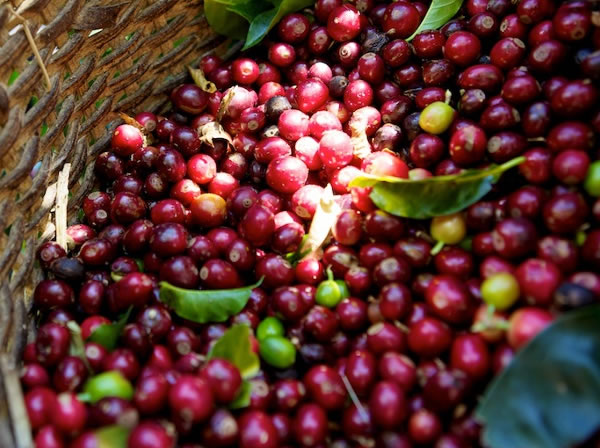
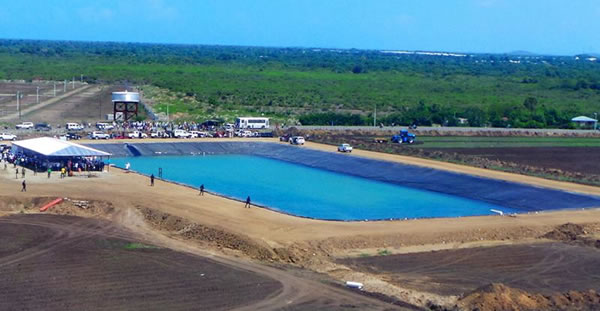
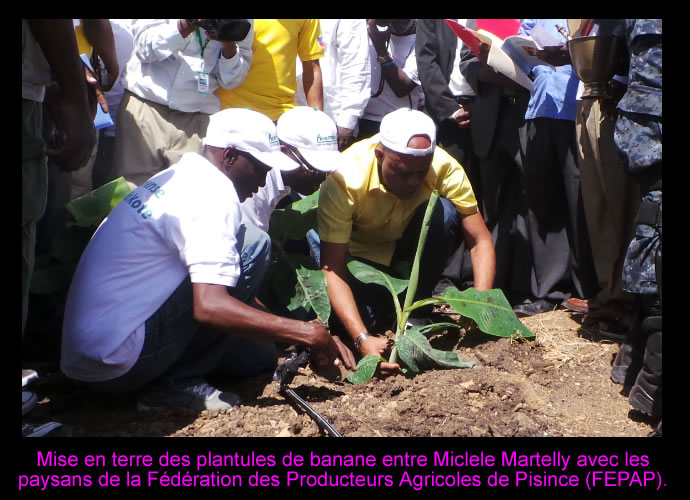
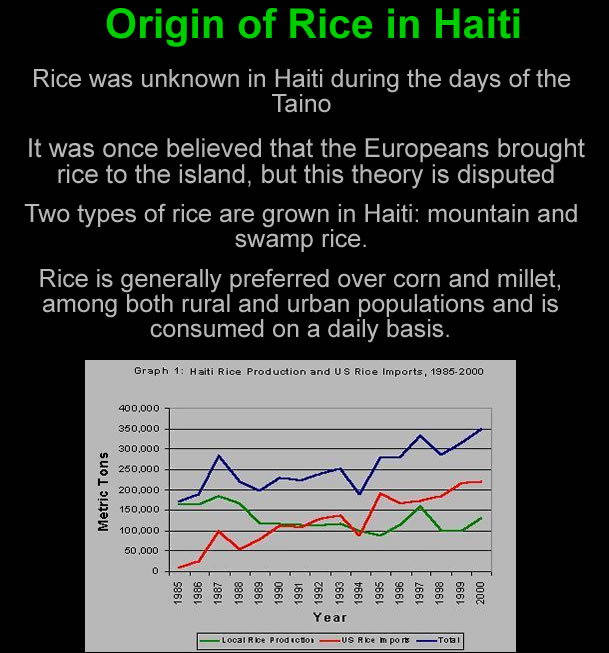
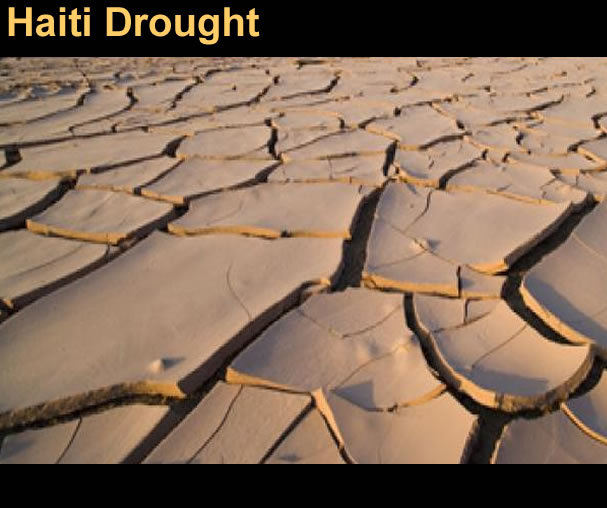
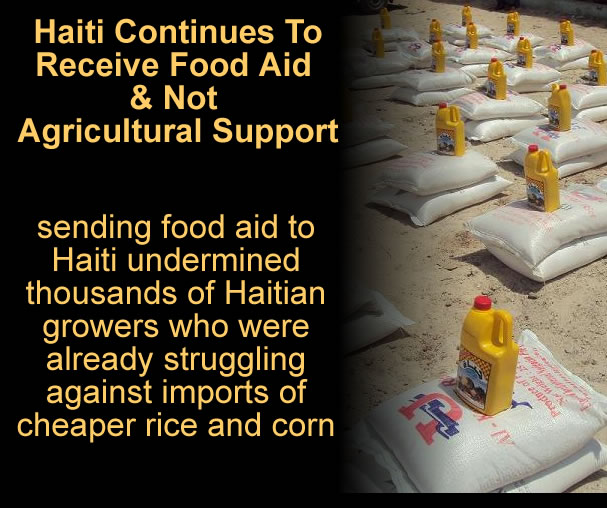
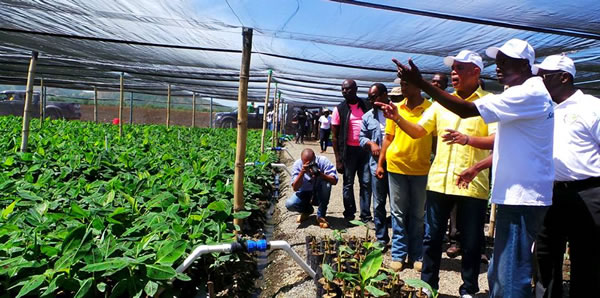
 Love between Barack and Michelle Obama
Love between Barack and Michelle Obama  Nouveau College Bird in Port-au-Prince, Haiti
Nouveau College Bird in Port-au-Prince, Haiti 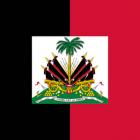 Haitian Flag Under Francois Duvalier changed in 1964 to black...
Haitian Flag Under Francois Duvalier changed in 1964 to black...  Delimart Plaza, Delmas 32, Port-au-Prince, Haiti being looted
Delimart Plaza, Delmas 32, Port-au-Prince, Haiti being looted  Rafael L. Trujillo welcoming Paul Magloire in Santo Domingo
Rafael L. Trujillo welcoming Paul Magloire in Santo Domingo 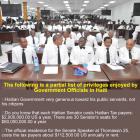 Partial list of privileges enjoyed by Government officials in...
Partial list of privileges enjoyed by Government officials in...  Commissioner Frantz Pierre indicted for accepting bribes
Commissioner Frantz Pierre indicted for accepting bribes  Dr. Michaëlle Amédée Gédéon is dead
Dr. Michaëlle Amédée Gédéon is dead 


